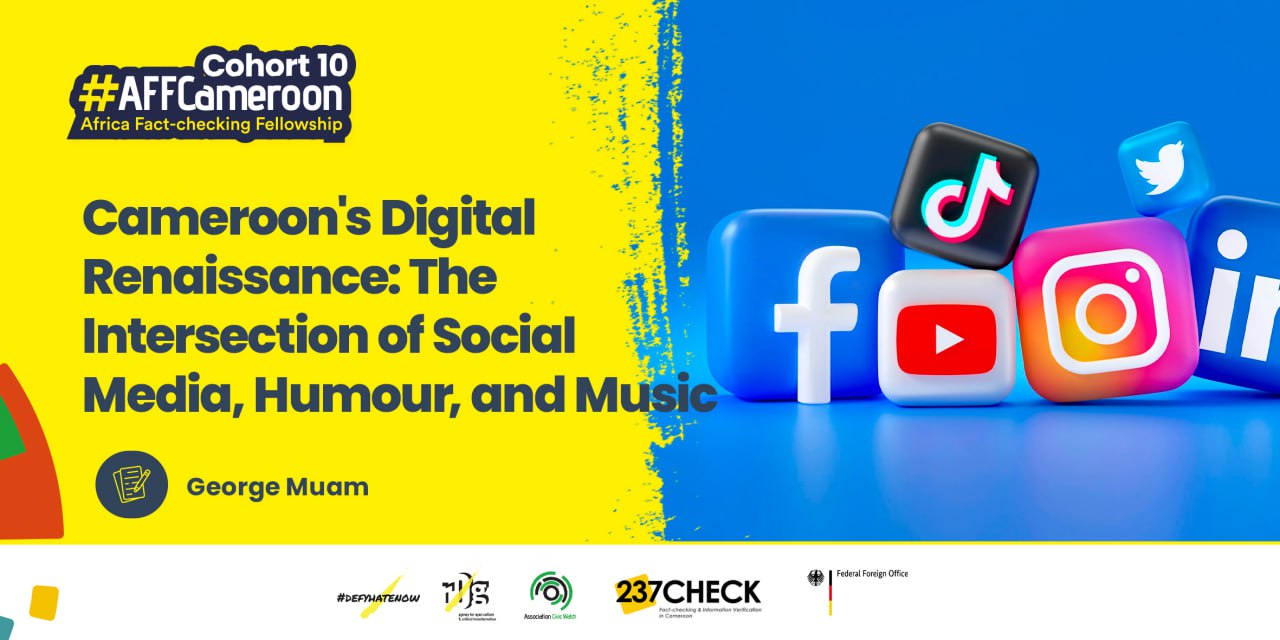Introduction
‘Sister Mary, Ma boo eh, family na one, bimoulé d’abord’, are some comic catch-phrases that have become very popular in Cameroon, just like the comedians using them in their skits. The rise of social media is playing a key role in the blossoming of the music and comedy sectors, shifting focus from traditional stand-up shows to short engaging skits, and this has been made possible by the accessibility and reach of platforms such as Facebook, YouTube and Tik Tok. In this report, we will see how social media is contributing to the emergence of diverse comedic voices, before looking at how it is being used as a tool to promote music.
Body
Social media has continued to transform the manner in which humour is produced and consumed in Cameroon. It has lowered barriers for aspiring comedians in the country, with platforms that allow anyone with a smartphone to create and share comic content, which their followers consume from the comfort of their homes or wherever they find themselves. This has brought about the closure of hitherto popular cinema halls across the country while veteran comedy stars of the yesteryears like Oncle Ntsama, Valery Ndongo, Major Assé, Kouakam Narcisse and many others who made their names through stand-up comedy shows have been eclipsed. Today, it is the turn of youngsters like Ulrich Takam who charms his followers with content about life in a typical village setting, Auntie Felicia with his versatile roles, Richard and his adventures, CG in the shoes of a typical female gossip character, as well as a typical African mother, Pa Ngwa with the struggles of a single parent, and others who have sprung to prominence by leveraging the power of social media.
Comedians in Cameroon and beyond are now able to reach a global audience without the need for a TV network or stand-up comedy nights. This is part of the reason we no longer hear much about halls like Le Mfoundi, Capitole, Le Berlitz, Le Bonapriso, Cinecam, Concorde and others, which in the past served both as movie and live concert halls. The halls have been replaced by online communities on Facebook and Instagram where users share and discuss comedy, fostering a sense of engagement while the videos garner millions of views, thereby creating international stars overnight.
Another evolution that has come with the advent of social media is the shift to short-form content such as skits, memes and quick jokes which cater to the fast-paced consumption habits of social media users. Social media gives room for real-time interaction with audiences, enabling comedians to receive immediate feedback and adapt their content accordingly. Through their comedy, the content creators also address social ills such as drug abuse, excesses, criticise deviant behaviour , and influence public opinion and the attitudes of their followers.
While comedians have made social media their newfound gold mine, musicians too have not been asleep. Across the board, ace Cameroon musicians like Maahlox, Salatiel, Magasco, Mr Leo, Vinhora, Kocee, Locko and Mimie have abandoned traditional music distribution channels for social media platforms. Today, music is no longer distributed to portable devices like cassettes, discs or USB keys.
The power of social media in promoting music was again felt in Cameroon in the month of November 2024, when it was used to revive the career of Prince Aimé through his hit song, “Viviane”. The kicker was given by Ivorian musician, Debordo Leekunfa, who did an unauthorized remix of the song before struggling to get approval from the artist for a collaboration. Cameroonian musicians quickly jumped on the opportunity with Maahlox championing the course. When the song dropped in early November, Cameroonians across the board, including Samuel Eto’o, Prof Jean Bahebeck, Cabral Libii and others pooled their efforts together to promote the song which hit four million views on YouTube within 24 hours.
The artist Prince Aimé has also gone ahead to release another remix of the song with Nigerian singer, Yemi Alade, and is not set to embark on a world tour, all thanks to the power of social media. As of December 2, 2024, YouTube views on the remix of “Viviane” stood at over six million.
Conclusion
Social media has proven to be an asset for Cameroonian comedians and musicians who are leveraging their different online platforms to promote their art. Thanks to the power of social media, comedians such as Auntie Felicia, Richard, Pa Ngwa, Dorcas, and Senior Pastor have emerged and are now going international. Since the advent of social media, the production and distribution of music has significantly switched to streaming platforms where the artists earn money through views, downloads and likes. The recent outburst of solidarity demonstrated towards Cameroonian musician, Prince Aimé, is a testament of how social media is being used to foster solidarity and build bonds which artists leverage in order to promote their art.
By George Muam, #AFFCameroon Cohort 10 Fellow



